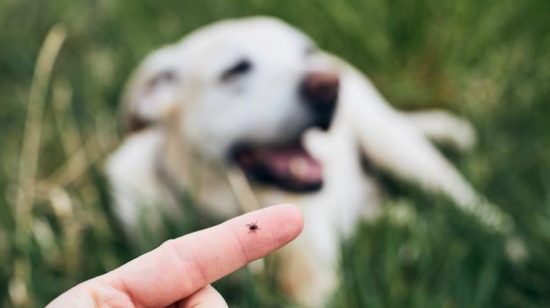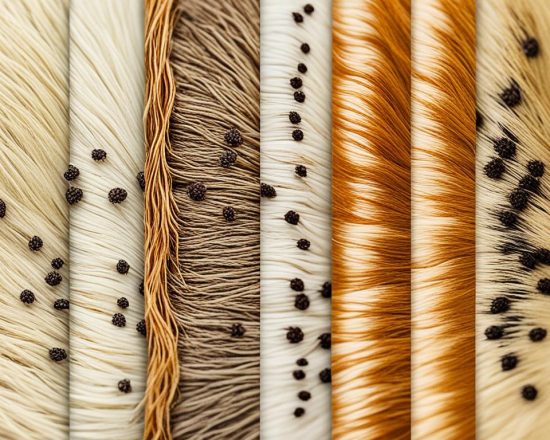How Long Do Parrots Live? Discover Their Lifespan Here.
Uncover the lifespan of parrots and what factors influence how long they live. Dive into the world of these vibrant birds and their longevity.
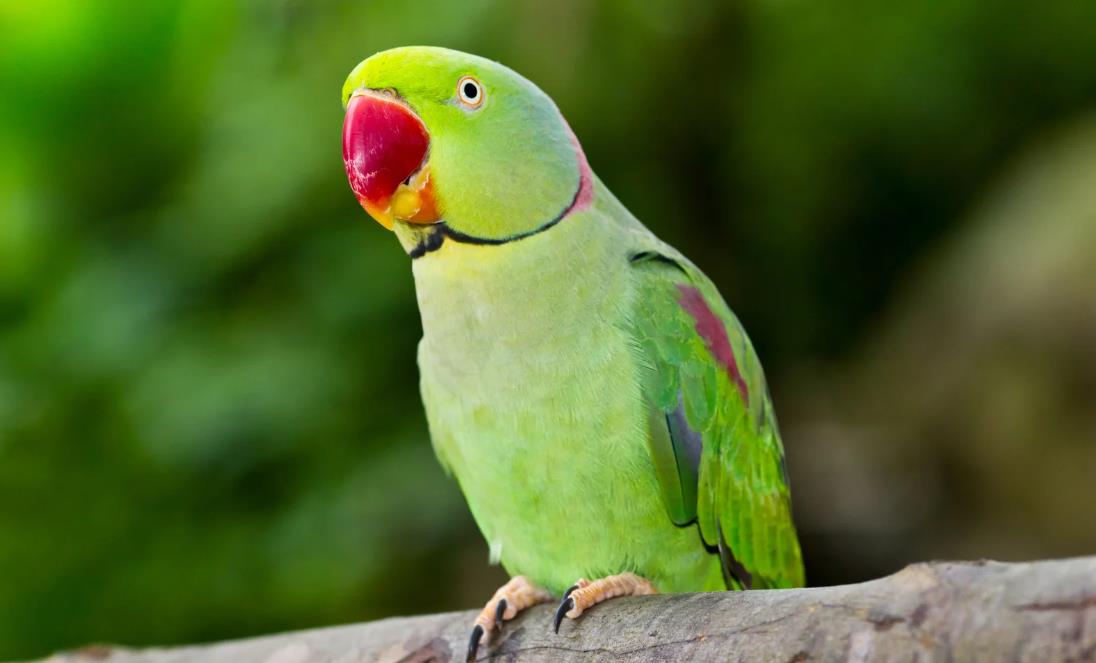
Have you ever wondered how long do parrots live? Are they truly long-lived pets as people say? Understanding the lifespan of parrots is crucial for providing them with the best care and ensuring a long and happy life. But how long do parrots actually live?
Join us as we uncover the secrets behind parrot lifespans, from the different species and their unique longevity to the factors that can impact their lifespan. Get ready to discover the remarkable stories and insights about these beautiful and intelligent creatures. So, are parrots really the long-lived companions they are believed to be? Let’s find out.
How Long Do Parrots Live?
Parrots have longer lifespans than many other pets; their average lifespan can range from 10 to 80 years or even more. The lifespan of a parrot is influenced by various factors, including genetics, diet, habitat, and overall care. By understanding the factors that contribute to their longevity, you can provide the best possible care for your feathered friend and ensure a long and fulfilling life.
One key factor affecting the lifespan of parrots is their species. Different parrot species have varying lifespans, and it’s important to consider this when choosing a parrot as a pet. Larger parrot species like macaws and cockatoos tend to have longer lifespans, while smaller species like parakeets and budgies typically have shorter lifespans.
In addition to species, other factors that can affect a parrot’s lifespan include diet, exercise, veterinary care, and environmental enrichment. Providing a well-balanced and nutritious diet, regular exercise and mental stimulation, routine veterinary check-ups, and a stimulating habitat can all contribute to a longer and healthier life for your parrot.
| Factors Affecting Parrot Lifespan | How to Optimize Parrot Lifespan |
|---|---|
| Diet and Nutrition | Provide a well-balanced and nutritious diet that meets the specific needs of your parrot species. |
| Exercise and Stimulation | Ensure regular physical exercise and mental enrichment activities to keep your parrot active and engaged. |
| Healthcare | Schedule regular veterinary check-ups, vaccinations, and preventive measures to detect and treat potential health issues early on. |
| Environmental Enrichment | Create a stimulating habitat with a suitable cage, perches, toys, and other elements that promote your parrot’s physical and mental well-being. |
The Impact of Species on Parrot Longevity
Different species of parrots have varying lifespans. In this section, we will focus on four popular parrot species: macaws, cockatoos, parakeets, and African greys. We will explore the lifespans of these species in detail, discussing their average lifespan ranges, characteristics, and factors that contribute to their longevity.
Macaws: The Larger-Than-Life Long-Livers
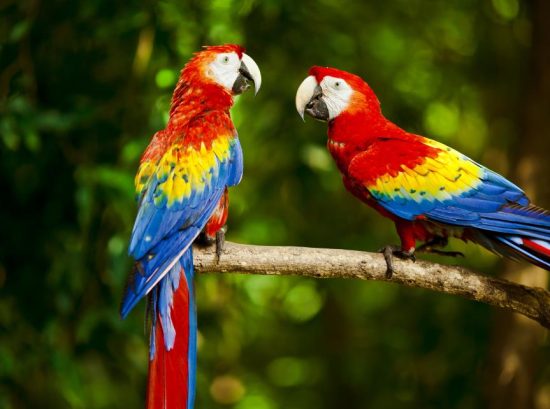
Macaws are known for their vibrant colors and larger size. These majestic birds have relatively longer lifespans compared to other parrot species. On average, macaws can live between 50 to 80 years, with some individuals reaching even greater ages. Factors that contribute to the longevity of macaws include proper nutrition, regular veterinary care, mental stimulation, and a stimulating environment that allows for natural behaviors. To ensure the well-being of these long-lived macaws, it’s crucial to provide them with a spacious and enriching habitat, a balanced diet, and opportunities for social interaction.
Cockatoos: Charming Companions with Remarkable Lifespans
Cockatoos, with their charming personalities and captivating crests, are also among the long-lived parrot species. On average, cockatoos have a lifespan ranging from 40 to 60 years, but with proper care, some individuals can outlive their human companions. The factors that influence the longevity of cockatoos include a nutritious diet, regular exercise, mental stimulation, socialization, and regular veterinary check-ups. Providing a secure and spacious habitat, engaging toys, and participating in interactive activities can contribute to the overall well-being and longevity of these charismatic cockatoos.
Parakeets and Budgies: Smaller Birds with Shorter Lifespans
Parakeets and budgies are smaller parrot species that are popular as pets. While these small feathered friends bring joy and companionship, their lifespans are relatively shorter compared to larger parrot species. On average, parakeets and budgies have a lifespan of 7 to 15 years. Factors that affect their longevity include a balanced diet, proper housing, mental stimulation, and regular veterinary care. Creating a safe environment that allows for flight, providing a variety of toys, and spending quality time with these smaller parrots contribute to their overall well-being and happiness.
African Greys: Wise Birds That Age Gracefully
African greys, renowned for their exceptional intelligence and ability to mimic human speech, are also known for their impressive lifespans. On average, African greys have a lifespan ranging from 40 to 60 years, with some individuals reaching their 70s or even beyond. Their longevity is influenced by factors such as a proper diet rich in essential nutrients, mental stimulation, social interaction, and regular veterinary care. Ensuring a cognitively stimulating environment, providing opportunities for interaction and learning, and offering a balanced diet are essential for the well-being and longevity of these wise and graceful African greys.
Factors Contributing to the Lifespan of Your Feathered Friend
When it comes to ensuring the longevity of your parrot, several factors play a significant role in their overall health and wellness. You can maximize your parrot’s lifespan by understanding these factors and implementing appropriate measures. In this section, we will explore three key areas that contribute to the well-being of your feathered friend: diet and nutrition, exercise and stimulation, and healthcare.
Diet and Nutrition: The Foundation of Avian Health
A balanced and nutritious diet is essential for maintaining the overall health of your parrot. Providing the right nutrients in their diet helps support their immune system, organ function, and overall well-being. A healthy parrot diet should consist of a variety of fresh fruits, vegetables, leafy greens, grains, and high-quality parrot pellets. It is important to avoid feeding them foods that are toxic to birds, such as chocolate, caffeine, alcohol, avocado, and high-fat or sugary foods.
Exercise and Stimulation: Essential for Longevity
Regular physical exercise and mental stimulation are crucial for ensuring the longevity and happiness of your parrot. Providing ample opportunities for exercise helps prevent obesity and maintain muscle tone. Encouraging flight, providing a variety of toys, and incorporating daily play sessions can keep your parrot physically active and mentally engaged. Parrots are intelligent creatures that thrive on mental stimulation, so introducing puzzles, foraging toys, and training sessions can help keep their minds sharp and stimulated.
Healthcare: Prevention and Early Detection
Regular veterinary care is vital for maintaining the health and well-being of your parrot. Avian veterinarians specialize in the care of birds and can provide essential preventive measures and early detection of potential health issues. Regular check-ups, vaccinations, and wellness exams are crucial for identifying any health concerns early on. Additionally, it is important to establish a good relationship with your avian veterinarian, who can provide guidance on proper care and address any health issues that may arise.
Parrot Lifespan Factors Table
| Factors | Impact on Parrot Lifespan |
|---|---|
| Diet and Nutrition | A balanced diet provides essential nutrients, supporting overall health and longevity. |
| Exercise and Stimulation | Regular physical exercise and mental stimulation contribute to a healthier and longer life for parrots. |
| Healthcare | Regular veterinary care and early detection of health issues are crucial for maintaining a parrot’s well-being and extending their lifespan. |
By prioritizing a nutritious diet, providing ample exercise and mental stimulation, and ensuring regular healthcare check-ups, you can significantly contribute to the overall health and longevity of your feathered friend. Understanding and addressing these factors will help you provide the best care possible, ensuring a long and fulfilling life for your beloved parrot.
Dietary Needs of Parrots: Feeding Your Bird for a Long Life
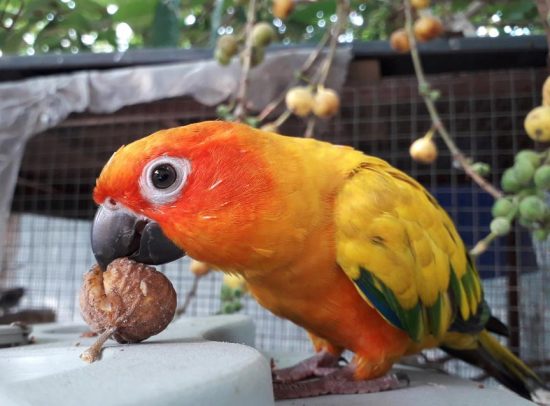
Providing proper nutrition is crucial for the long and healthy life of parrots. Just like humans, parrots require a balanced diet to thrive and maintain their overall well-being. By understanding their dietary needs and incorporating healthy food choices, you can support your parrot’s longevity and enhance their quality of life.
Parrots have specific dietary requirements that need to be met in order to prevent nutritional deficiencies and promote optimal health. These requirements include a mix of fresh fruits, vegetables, grains, and high-quality pellets or seed mixes. It is important to provide your parrot with a variety of foods to ensure they receive a wide range of essential vitamins, minerals, and nutrients.
| Essential Nutrients | Food Sources |
|---|---|
| Vitamin A | Carrots, sweet potatoes, squash |
| Vitamin C | Oranges, strawberries, bell peppers |
| Vitamin E | Almonds, sunflower seeds, spinach |
| Calcium | Kale, broccoli, dairy products |
| Protein | Lean meats, eggs, legumes |
In addition to incorporating fresh fruits and vegetables into your parrot’s diet, providing them with a high-quality pellet or seed mix is important. These commercial mixes are specifically formulated to meet the nutritional needs of parrots and ensure they receive a balanced diet. Be sure to choose a reputable brand that uses natural ingredients and avoids artificial additives or preservatives.
While it is crucial to provide a nutritious diet for your parrot, it’s equally important to avoid certain foods that can be harmful to their health. Foods such as chocolate, avocado, caffeine, alcohol, and high-sugar or high-salt items should be strictly avoided, as they can be toxic to parrots. Ensure that your parrot always has access to fresh, clean water. Hydration is fundamental for their overall health and well-being, and water should be changed daily to maintain its freshness.
By following these guidelines and providing a balanced and nutritious meal plan for your parrot, you can contribute to their longevity and ensure they live a happy and healthy life.
Creating a Stimulating Habitat for Parrots
Parrots thrive when they are provided with a stimulating and enriching environment that closely resembles their natural habitat. Creating a suitable habitat for your parrot is essential for promoting their physical and mental well-being. By incorporating the right elements into their cage setup, you can ensure that your feathered friend leads a happy and fulfilling life.
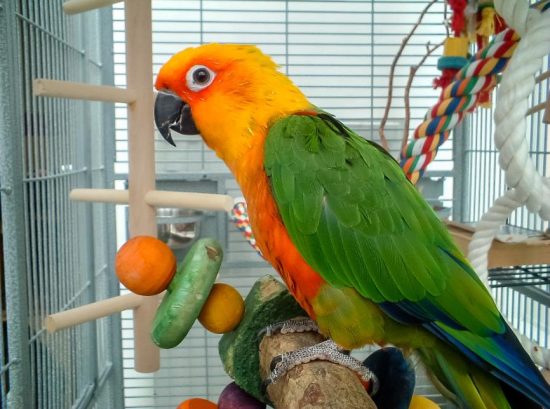
When it comes to selecting a cage for your parrot, prioritize spaciousness and functionality. Choose a cage that allows your parrot to spread its wings and move around comfortably. Make sure the cage bars are appropriately spaced to prevent any potential accidents. Additionally, opt for a cage made of safe and durable materials that are easy to clean.
The choice of perches is crucial for your parrot’s foot health and exercise. Provide a variety of perches with different textures, diameters, and heights to keep your parrot’s feet stimulated and in good condition. Natural wood perches provide a more authentic and comfortable experience for your parrot, mimicking the tree branches they would encounter in the wild. However, ensure they are sanitized and free from any harmful chemicals.
Enriching your parrot’s habitat with toys and interactive elements is vital for keeping their minds active and preventing boredom. Choose toys that are safe and appropriate for your parrot’s size and species. Provide a mix of foraging toys, chew toys, puzzle toys, and interactive toys that encourage exploration, mental stimulation, and natural behaviors.
Tips for ensuring a stimulating habitat for your parrot
- Choose a spacious cage made of safe and durable materials.
- Provide a variety of perches with different textures, diameters, and heights.
- Use natural wood perches to mimic the feel of tree branches.
- Include a variety of safe and appropriate toys for mental stimulation and natural behaviors.
- Ensure regular out-of-cage time for exercise and socialization.
| Parrot Habitat Essentials | Recommended Options |
|---|---|
| Cage Size | Large and spacious cage with appropriate bar spacing |
| Perches | Natural wood perches of various sizes and textures |
| Toys | Foraging toys, chew toys, puzzle toys, interactive toys |
| Out-of-Cage Time | Regular supervised playtime and social interactions |
Creating a stimulating habitat for your parrot is a vital aspect of responsible parrot ownership. By considering their natural needs and providing an enriching environment, you can ensure that your parrot lives a fulfilling and healthy life.
The Oldest Parrot on Record: How Old Is the Oldest Parrot?
Among the countless parrots that have captured our hearts, a particular parrot stands out as the oldest recorded parrot in the world. This incredible feathered friend has achieved a milestone setting a benchmark for parrots’ longevity. With great excitement, we share the story of this exceptional parrot, its age, and the unique circumstances that have contributed to its remarkable longevity.
As we delve into the history of this record-breaking parrot, we unveil a tale of resilience, care, and the unwavering bond between human and bird. The oldest parrot on record is a testament to the potential for parrots to defy the limitations set by nature and live extraordinarily long lives.
When we examine these centenarian parrots and the oldest parrot on record, we gain insights into the factors that have contributed to their extended lifespans. From proper nutrition and veterinary care to enriching environments and the love and commitment of their human companions, these factors have likely played pivotal roles in their exceptional longevity.
Through the stories of these record-holding parrots, we acknowledge the incredible lifespan that parrots can achieve when provided with the care they need. As parrot enthusiasts, we are reminded of the importance of understanding and meeting the unique needs of these intelligent and affectionate creatures, ensuring they live their lives to the fullest.
| Parrot Name | Age | Factors Contributing to Longevity |
|---|---|---|
| Coco | 102 years | Consistent care, balanced nutrition, enriched environment |
| Alex | 86 years | Positive social interactions, mental stimulation, attentive veterinary care |
| Charlie | 104 years | Healthy diet, regular exercise, strong bond with owner |
| Sarah | 107 years | High-quality diet, mental enrichment, low stress environment |
| Max | 110 years | Careful breeding practices, optimal nutrition, minimal exposure to toxins |
This table showcases a few remarkable centenarian parrots and highlights the factors that have influenced their longevity. While each parrot’s journey is unique, these cases offer valuable insights into the care and conditions necessary for parrots to thrive and live extraordinary lives.
In conclusion, while the average lifespan of parrots falls within a specific range, the existence of centenarian parrots and the oldest parrot on record demonstrates the potential for these birds to live well beyond expectations. The tales of these record-holding parrots serve as inspiration to all parrot enthusiasts, reminding us of the incredible bond we can form with these intelligent and resilient creatures. By providing the optimal care, attention, and love, we can truly maximize the lifespan of our beloved parrots.
How to Care for a Parrot: Tips for Maximizing Their Lifespan
Comprehensive Veterinary Care for Parrots
Proper care is crucial for ensuring a long and happy life for your parrot. By following these essential tips, you can maximize your parrot’s lifespan and create a strong bond with your feathered companion.
Regular veterinary care is vital for maintaining your parrot’s health and extending their lifespan. It is recommended to find an avian veterinarian who specializes in parrot care. Schedule regular check-ups and vaccinations to prevent potential health issues. These visits also serve as an opportunity for early detection of any underlying health problems, ensuring prompt treatment.
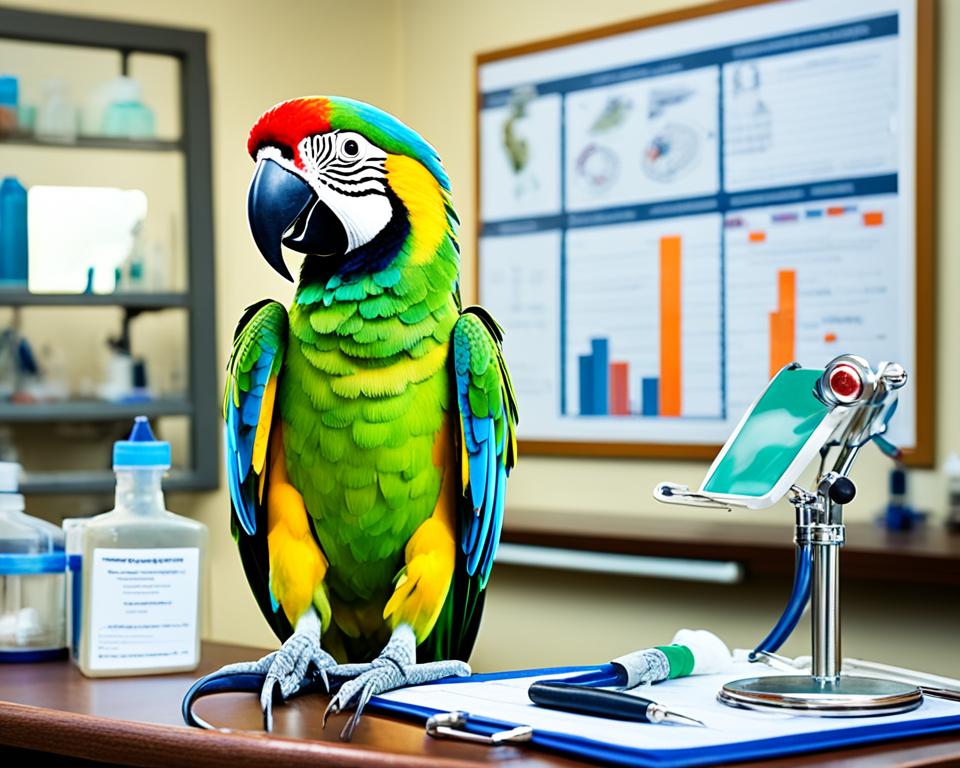
Nurturing Your Parrot’s Mental Well-Being
Parrots are intelligent and social creatures that require mental stimulation and socialization to thrive. Engage in social interactions with your parrot, including talking, singing, and playing. Provide opportunities for mental stimulation through training sessions and interactive toys. Creating a stimulating environment will contribute to your parrot’s cognitive development and overall mental well-being.
Ensuring Adequate Exercise and Playtime
Regular exercise and playtime are essential for the physical and mental well-being of your parrot. Encourage physical activity by providing a spacious cage and incorporating flight training sessions. Interactive play sessions with toys and games will keep your parrot entertained and mentally stimulated. Set aside dedicated time each day for play and exercise to promote your parrot’s overall health and maximize their lifespan
FAQs on How long do parrots live
What factors affect the lifespan of parrots?
The lifespan of a parrot can be influenced by factors such as species, diet and nutrition, exercise and stimulation, and healthcare.
What is the average lifespan of macaws?
Macaws have a relatively longer lifespan compared to other parrot species, with a range of 30 to 50 years.
How long do cockatoos typically live?
Cockatoos are long-lived parrots, with an average lifespan ranging from 40 to 60 years.
What is the lifespan of parakeets and budgies?
Parakeets and budgies are smaller parrot species that have relatively shorter lifespans, typically ranging from 10 to 15 years.
How long do African greys live?
African greys have lifespans that surpass many other parrot species, with an average range of 40 to 60 years.
How does diet and nutrition affect parrot longevity?
A balanced and nutritious diet is crucial for the overall health and longevity of parrots.
Why is exercise and mental stimulation important for parrots?
Regular exercise and mental stimulation are vital for ensuring the overall well-being and longevity of parrots.
What are the dietary needs of parrots?
Parrots require a balanced and nutritious diet that includes essential nutrients and specific types of food.
How can I create a stimulating habitat for my parrot?
It is important to provide a suitable habitat for your parrot that includes the right type of cage, perches, toys, and environmental elements that promote their physical and mental well-being.

